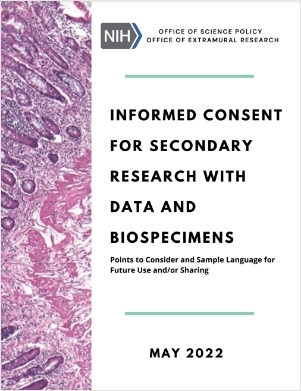Get resources and template language on obtaining informed consent for secondary research with data and biospecimens and for genomic research activities.
Informed Consent for Secondary Research with Data and Biospecimens
In the resource Informed Consent for Secondary Research with Data and Biospecimens, NIH provides points to consider, instructions for use, and optional sample language. The above are designed for informed consent documents in the context of research studies that include plans to store and share collected data and biospecimens for future use. Use of this resource is optional. This resource only addresses consent for the storage and sharing of data and biospecimens collected during a primary research protocol, for the purposes of future secondary research. This resource is not a comprehensive informed consent document.
As an example, below is a selection of sample language that introduces a study and describes what samples will be collected, as well as what will be done with the samples, during the study. The language can be adjusted as needed. This excerpt, as well as additional sample language for other parts of an informed consent document, can be found on pages 4-7 of Informed Consent for Secondary Research with Data and Biospecimens.

Sample Language:
This study is collecting data and biospecimens from you. We would like to make your data and biospecimens available for other research studies that may be done in the future. The research may be about similar diseases or conditions to this study. However, research could also be about unrelated diseases, conditions, or other types of research. These studies may be done by researchers at this institution or other institutions, including commercial entities. Our goal is to make more research possible. We plan to keep your data and biospecimens for [Insert time frame as indicated in the study protocol].
Your data and biospecimens may be shared with researchers around the world. However, the decision to share your data and biospecimens is controlled by [indicate which entity has control]. To get your data and biospecimens, future researchers must seek approval from [indicate which entity has control]. The researchers must agree not to try to identify you.
- Option #1: If the data and biospecimens are coded and can be linked back to the identity of the participant:
We will protect the confidentiality of your information to the extent possible. Your data and biospecimens will be coded to protect your identity before they are shared with other researchers. [indicate which entity has the code key] will have a code key that can be used to link to your identifying information. The code key will be securely stored.- Option #2: If the data and biospecimens cannot be easily linked back to the identity of the participant:
Your name and identifying information will be removed from any data and biospecimens you provide before they are shared with other researchers. Researchers cannot easily link your identifying information to the data and biospecimens.
Informed Consent for Human Genomic Research
Additional considerations may be applicable for research studies that include the storage and sharing of genomic data. The NHGRI Informed Consent Resource, originally created in 2010 and continuously maintained, provides sample informed consent language, informed consent forms, and additional information about the required elements for informed consent and special considerations for genomics research.
- NHGRI - Informed Consent
- NHGRI – Guidance on Writing Required Elements of Informed Consent Forms
- NHGRI – Library of Existing Informed Consent Forms for Genomic Research Project
In addition, The Global Alliance for Genomics and Health maintains sample consent clauses relevant to genomics research projects that may be helpful when developing consent forms.
